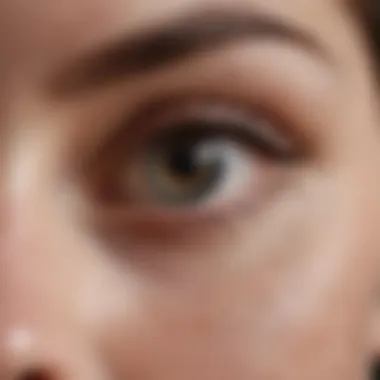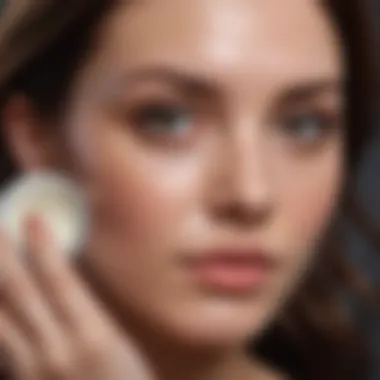Top Eye Creams for Sensitive Skin: A Comprehensive Guide


Intro
Navigating the world of skin care can be challenging, particularly for individuals with extremely sensitive skin. The eye area is among the most delicate and prone to irritation. Selecting the right eye cream requires a keen understanding of ingredients and formulations. This article aims to delineate the specific factors to consider when choosing eye creams for sensitive skin. In addition, it will offer recommendations for products known for their gentle approach and effective results.
The delicate skin around the eyes is often the first to show signs of fatigue and aging. For those with sensitivity, reactions to products can be severe, ranging from redness to puffiness. Thus, knowledge about safe ingredients and proper application techniques is essential. This will not only help to soothe the skin but also enhance the efficacy of the products used. Let's explore what one should consider when choosing eye creams and highlight some of the best options available.
Understanding Extremely Sensitive Skin
Understanding extremely sensitive skin is crucial for anyone seeking effective remedies and products for their skincare routine. Sensitive skin often reacts adversely to various external factors such as environmental conditions, skincare products, and even lifestyle choices. This section highlights the characteristics that define sensitive skin and the common triggers that can exacerbate its condition.
Characteristics of Sensitive Skin
Sensitive skin typically exhibits several distinct traits. It may appear red or inflamed, especially after exposure to irritants. Many individuals with this condition report sensations of itching, burning, or tightness. Dry patches can also be common, primarily due to the skin's impaired barrier function. Sensitive skin might react poorly to products that include fragrances, alcohols, or other harsh chemicals. Overall, being aware of these characteristics assists in making informed decisions about skincare, especially when it comes to selecting an appropriate eye cream.
Common Triggers for Sensitivity
Several factors can instigate or worsen sensitivity in individuals. Common triggers include:
- Environmental Factors: Extreme weather conditions, such as wind, cold, and excessive heat, can strip moisture from the skin and trigger reactions.
- Skincare Products: Many conventional products contain irritants like synthetic fragrances, parabens, and sulfates. Such ingredients can provoke redness and discomfort.
- Diet and Lifestyle: Certain foods, especially those rich in histamines, may cause flare-ups. Additionally, stress can significantly affect skin health.
- Allergens: Pollutants and allergens in the environment can lead to increased sensitivity. Ingredients like perfumes or dyes are often found in many products and can be problematic for sensitive skin.
In summary, understanding the specific characteristics of sensitive skin and recognizing common triggers can empower individuals to make safer choices in their skincare practices. This knowledge is essential in the quest for effective solutions, especially when it comes to eye creams designed for sensitive skin.
The Importance of Eye Cream
The skin around the eyes is particularly delicate and requires specific care. This area is often the first to show signs of aging, fatigue, and environmental stress. Applying eye cream is a crucial step in a skincare routine for individuals with extremely sensitive skin. It not only hydrates but also protects and nourishes this fragile region, making it vital for maintaining a youthful appearance and overall skin health.
Why Target the Eye Area
The eye area possesses unique characteristics that differentiate it from the rest of the face. The skin here is thinner than that on the cheeks or forehead, leading to increased vulnerability to irritation. Factors such as sun exposure, pollution, and lack of sleep can exacerbate issues like puffiness, dark circles, and fine lines.
- Sensitive skin types may experience heightened reactions due to its delicate nature, necessitating specialized products designed to minimize irritation.
- Since eyes are often exposed to irritants from makeup or environmental factors, a focused approach helps shield against these elements.
Targeting the eye area with appropriate formulations can significantly improve hydration levels, smooth texture, and a reduced appearance of imperfections.
Role of Eye Creams in Skincare Routine
Incorporating eye creams into a skincare regimen is not merely an aesthetic decision; it is functional. These products typically contain a blend of beneficial ingredients that directly address concerns specific to the eye area. The right eye cream can:
- Provide Hydration: Essential for maintaining skin elasticity and softness, suitable for sensitive skin types.
- Combat Signs of Aging: Many eye creams contain peptides or retinol that work to diminish fine lines and wrinkles.
- Reduce Puffiness and Dark Circles: Ingredients such as caffeine or vitamin K may assist in alleviating these common concerns.
Regular use of eye creams can create a barrier against external stressors while boosting moisture retention. They should be applied gently, utilizing a light tapping motion to avoid additional stress on the skin. Implementing this step can elevate a skincare routine, particularly for those experiencing sensitivity.
Important Note: Always choose formulations labeled as hypoallergenic and fragrance-free to minimize the risk of irritation.
Determining the right eye cream requires understanding both the ingredients and your skin’s unique needs. Regular assessment of how products interact with your skin can help optimize results.
Criteria for Selecting Eye Creams


When it comes to selecting eye creams for extremely sensitive skin, the decision should not be taken lightly. Sensitive skin can react adversely to various substances, making this process crucial. Identifying the right eye cream can significantly enhance your skincare routine. It can soothe irritation, minimize inflammatory reactions, and ultimately protect the delicate eye area. Not every product on the market is suitable, hence understanding the specific criteria is essential for selecting well-formulated eye creams.
Key Ingredients to Look For
Choosing the right ingredients is key to ensuring the effectiveness of an eye cream. When selecting a product, consider the following beneficial ingredients:
- Peptides: These are small proteins that help stimulate collagen production and improve skin elasticity, making them essential for firming the delicate skin around the eyes.
- Hyaluronic Acid: Known for its moisture-retaining properties, hyaluronic acid hydrates the skin and reduces the appearance of fine lines and wrinkles.
- Ceramides: They help maintain the skin's barrier and prevent moisture loss, essential for sensitive skin types that tend to be dry or dehydrated.
- Chamomile Extract: This natural ingredient has soothing properties that help calm irritation and redness, providing relief to sensitive skin.
- Glycerin: A humectant that draws moisture into the skin, glycerin is effective in keeping the eye area hydrated without causing irritation.
While these ingredients are generally safe, it is always wise to check for individual sensitivities.
Ingredients to Avoid
Equally important as recognizing beneficial ingredients is being aware of those that can provoke reactions. Here are some common irritants to avoid in eye creams:
- Fragrances: Often added for scent, fragrances can trigger allergic reactions and worsen sensitivity. Opt for fragrance-free variants.
- Alcohol: Products containing high amounts of alcohol can dry the skin, leading to irritation and discomfort.
- Parabens: While used as preservatives, parabens have come under scrutiny for their potential health risks. They may cause skin reactions, especially in sensitive individuals.
- Essential Oils: Natural does not always mean safe. Some essential oils can be too potent and lead to irritation or allergic reactions.
- Synthetic Dyes: These can cause reactions in sensitive skin and do not provide any benefit to the formulation itself.
> Always read the label carefully to ensure the product aligns with your skin’s needs.
Dermatological Testing and Certification
Finally, the importance of dermatological testing cannot be overstated. Always look for products that have undergone clinical testing for sensitivity. Certifications like hypoallergenic or non-comedogenic indicate that a product has been evaluated for its potential to cause reactions.
- Hypoallergenic: This term implies that the formulation is less likely to cause allergies or irritations, although it does not guarantee zero reactions.
- Ophthalmologist-tested: Products that have been tested by eye care professionals indicate safety for delicate eye areas, particularly important for contact lens wearers.
- Dermatologist-approved: Look for validations from certified dermatologists, ensuring that the cream meets safety standards for sensitive skin.
Selecting an eye cream that meets these criteria enhances its effectiveness and minimizes the risk of adverse reactions. It becomes a vital part of maintaining skin health, especially for those with extremely sensitive skin.
Top Eye Creams for Extremely Sensitive Skin
The significance of identifying the best eye creams for extremely sensitive skin lies in the unique needs of such skin types. Individuals with sensitive skin often grapple with various concerns, including redness, irritation, and discomfort. Therefore, the selection of suitable eye creams becomes crucial. These products must be gentle while still addressing issues such as puffiness, fine lines, and dark circles without causing further irritation. Understanding the specific elements, benefits, and considerations regarding eye creams not only aids in making informed choices but also enhances the overall experience of skincare.
Product Reviews and Recommendations
Review of Product One
One notable option is La Roche-Posay Toleriane Ultra Eye Contour. This cream is formulated specifically for sensitive skin and free from various common irritants. Its key characteristic is its blend of soothing ingredients, including thermal water and neurosensine. These components help to reduce the sensation of discomfort around the eyes, making it a beneficial choice for those who often experience reactions to skincare products. The unique feature of this eye cream is its lightweight texture, which allows for easy absorption without leaving a greasy residue. However, some users may find it slightly less hydrating for very dry skin types, necessitating additional moisture in their routine.
Review of Product Two
Another excellent recommendation is Avene Soothing Eye Contour Cream. This cream stands out due to its high tolerance formula enriched with Avene thermal spring water, which provides deep hydration while reducing irritation. The key characteristic of the Avene cream is its ability to soothe the eye contour area, making it a popular choice among those with extremely sensitive skin. Its unique feature is the addition of a silk-like texture that feels comfortable during application. While it delivers significant soothing benefits, some users might prefer a more intensive moisturizing product during the colder months.
Review of Product Three
The Biossance Squalane + Peptide Eye Gel is also a commendable option for sensitive skin. This product is notable because it emphasizes clean and sustainable formulations. Its key characteristic is the combination of squalane and peptides, which work to hydrate and firm the skin. This cream is regarded as a beneficial choice due to its lightweight gel formulation that is both refreshing and quick-absorbing. A unique feature of this eye gel is its cooling effect on application, which can be particularly advantageous for morning routines. Nonetheless, some users may find that it lacks sufficient moisture for their needs, leading to a preference for thicker creams.
Comparative Analysis of Key Products
Before choosing an eye cream, it's crucial to compare the various ingredients and their benefits. Here are some points of consideration:
- Ingredient Safety: All three products prioritize the safety of ingredients, minimizing potential irritants.
- Hydration Levels: La Roche-Posay and Avene emphasize hydration, while Biossance gives more focus on firming effects.
- User Experience: Feedback often highlights the soothing properties of both the Avene and La Roche-Posay creams, while the Biossance gel is noted for its pleasant texture.


Overall, the best eye cream should align with individual preferences and skin needs. Comparing options will guide in finding the most suitable product.
Application Techniques for Eye Creams
Understanding the proper techniques for applying eye creams is vital, especially for those with extremely sensitive skin. The delicate nature of the skin around the eyes makes it more susceptible to irritation. Correct application can maximize the benefits of eye creams while minimizing the risk of adverse reactions. Observing specific methods can lead to better product absorption and ultimately, improved results. This section provides detailed guidance on the best practices for application, frequency of use, and tools that help enhance the application process.
Best Practices for Application
When it comes to applying eye cream, technique matters significantly. Here are key practices to consider:
- Use a small amount: A little goes a long way. Using a pea-sized amount is usually sufficient for both eyes.
- Gentle tapping motion: Instead of rubbing, gently tap the cream with your ring finger. This finger applies the least pressure, preventing unnecessary stress on the skin.
- Start from the inner corner: Apply the cream starting from the inner corner of the eye, moving towards the outer corner. This direction helps in lymphatic drainage, reducing puffiness.
Besides these basic practices, it’s essential to wait a few minutes after application before continuing with other skincare steps or makeup. This allows the cream to properly absorb and work its magic.
Frequency of Use
Consistency in usage is critical for achieving the desired results. Here are some points to consider about how often one should apply eye cream:
- Daily application: Most eye creams should be used twice a day – morning and night. Morning application helps to combat puffiness and dark circles while nighttime use provides hydration and recovery during sleep.
- Adjust based on sensitivity: For individuals with extremely sensitive skin, it might be beneficial to start with applying the cream once daily and assess how the skin reacts. If tolerated well, increase the frequency gradually.
The frequency of application can be adjusted based on how the skin feels. Observing how the skin responds to the product is a crucial part of the routine.
Tools for Application
Several tools can aid in the application of eye creams, enhancing both the experience and effectiveness:
- Silicone spatulas: These allow for hygienic application and can help in measuring the right amount of product.
- Cooling eye masks: Using these before applying eye cream can reduce puffiness and soothe the area, preparing the skin for better absorption.
- Fingers: As mentioned, using the ring finger is common. It’s soft and can gently apply the cream without risking irritation.
Consumer Insights and Reviews
Consumer insights and reviews serve as a crucial component in understanding the effectiveness of eye creams for those with extremely sensitive skin. They provide real-world experiences that can help potential users gauge the product's performance beyond the marketing claims. A product that claims to be gentle and effective may not always deliver satisfactory results for every consumer, making user feedback invaluable.
When exploring eye creams specifically designed for sensitive skin, consumer reviews can illustrate products' effects, or lack thereof, on different skin types and conditions. Additionally, they often highlight the presence of irritants or allergens that may not be prominently featured in official descriptions. This first-hand knowledge assists in building trust for users deciding on a product that could greatly affect their skin's health.
Moreover, these insights offer a sense of community among users. Sharing experiences fosters discussions around sensitive skin care and elucidates various impacts on users' routines. This dialogue is important as it encourages others to seek information and pay attention to ingredients that are truly beneficial or harmful.
Overall, consumer insights and reviews emphasize genuine user satisfaction and dissatisfaction, leading to informed decisions in the quest for suitable eye care. They are an essential guide that complements expert recommendations and scientific evidence, blending personal anecdotes with professional opinions.
Real User Experiences
Real user experiences are often varied and informative. Many individuals with sensitive skin have personal stories reflecting their journey to find the right eye cream. Some users may recount frustrations with products that promised relief but led to unexpected reactions, such as redness or puffiness. These narratives underscore the need for careful ingredient consideration in eye creams.
- Sensitive Feedback: Users frequently point out key experiences, such as immediate reactions versus effects seen over time. This distinction can help others assess a product's suitability.
- Positive Outcomes: Conversely, satisfied users often share how a specific product alleviated their concerns, offering hope to those still searching.
- Ingredient Sensitivities: Many reviews dive deep into specific ingredients. This depth enables potential buyers to correlate their skin reactions with product formulations effectively.
"I have tried numerous creams, but [Product Name] was the only one that didn’t irritate my skin. My dark circles have also improved. I wish I had found it sooner!"
Such testimonials reinforce the value of shared experiences in identifying effective solutions for sensitive eyes.
Expert Recommendations


Expert recommendations lend authority to product choices, offering a layer of credibility that enhances consumer confidence. Dermatologists and skincare professionals can help people navigate complex formulations geared towards sensitive skin. Their insights often draw on extensive training, research, and firsthand experience with numerous products.
Experts typically focus on the following key aspects when recommending eye creams for sensitive skin:
- Ingredient Safety: Professionals often highlight products that contain soothing components like hyaluronic acid or chamomile, which can mitigate irritation.
- Non-Comedogenic Options: Dermatologists usually endorse creams that avoid clogging pores, crucial for avoiding further skin issues.
- Clinical Testing: Recommendations may favor brands that have undergone strict dermatological testing, ensuring lower risk of adverse reactions.
Receiving expert guidance can be the differentiating factor in deciding on a product. It emphasizes the importance of aligning personal needs with professional knowledge, particularly when sensitive skin is in question. Thus, the synergy between consumer insights and expert recommendations creates a robust framework for selecting the best eye creams for extremely sensitive skin.
Addressing Persistent Issues
The management of sensitive skin, particularly around the eye area, involves recognizing and addressing persistent issues that may hinder the effectiveness of skincare routines. Individuals with extremely sensitive skin often face unique challenges, which can include frequent allergic reactions, irritation from products, and various environmental aggressors.
Understanding these persistent issues is crucial for effectively choosing and applying eye creams. A tailored approach to skincare not only improves overall skin health but also enhances the efficacy of treatment products. Recognizing how external factors interact with sensitive skin can aid in preventing further reactions and optimizing care strategies.
Dealing with Allergies and Irritations
Allergies and irritations are frequent concerns for individuals managing sensitive skin. Symptoms may include redness, swelling, or a burning sensation. Identifying allergens can be tricky since reactions may arise from several sources, including skin care products, environmental elements, or even certain foods.
To effectively mitigate these irritations:
- Patch Testing: Always perform a patch test before introducing a new eye cream. Apply a small amount to the skin, ideally on the inner arm, and observe for 24 hours. This allows for early detection of adverse reactions.
- Ingredient Awareness: Educate yourself on common allergens. Ingredients like fragrances, dyes, and preservatives can trigger sensitivities. Opt for products labeled as hypoallergenic.
- Follow a Simple Routine: Avoid using many new products at once. A streamlined routine helps isolate which product may be causing a reaction.
By taking these steps, individuals can better navigate the potential for allergies while caring for their sensitive skin around the eyes.
When to Seek Professional Advice
In some situations, the challenges posed by sensitive skin require professional intervention. Knowing when to consult a dermatologist is essential for maintaining skin health.
Consider seeking professional guidance in the following scenarios:
- Persistent Symptoms: If irritation or redness continues despite taking precautions, it may be necessary to seek help.
- Severe Allergic Reactions: Symptoms like severe swelling or pain should be addressed immediately by a professional.
- Skin Conditions: If there is a presence of underlying skin conditions such as eczema or rosacea, a dermatologist can provide specific treatments tailored to sensitive skin.
Consulting with a professional allows for more effective management of sensitive skin issues. They can offer tailored product recommendations and treatment plans suitable for individual skin concerns, facilitating a more targeted approach to skincare.
Culmination and Final Thoughts
In this article, we have explored the specific needs of individuals with extremely sensitive skin, especially in the delicate eye area. Understanding the nuances of sensitivity is not just essential for effective skincare, but it also enables one to select products that minimize irritation. Choosing the right eye cream can lead to long-term benefits, such as improved skin hydration, reduced puffiness, and minimized fine lines while prioritizing safety over all else.
The importance of carefully selecting eye creams cannot be overstated. Products designed for sensitive skin must avoid harsh chemicals and incorporate soothing ingredients. This ensures that the risk of allergic reactions is significantly lower, which is crucial for maintaining skin health. The review of specific creams showcased those that excel in formulation, offering gentle yet effective results. Readers can take comfort in knowing that there are products tailored to their unique skin needs.
"The right eye cream can be transformative, especially for those with sensitivities. It serves not just as a treatment but as a comfort in daily skincare routines."
Being informed about the ingredients to look for, as well as those to avoid, plays a significant role in achieving desired outcomes. Additionally, understanding how to apply these creams effectively and how often to use them contributes to maximizing their benefits.
In summary, this article serves as a comprehensive guide that empowers readers to make informed decisions about their skincare. The journey to finding the right eye cream should not seem daunting. With the right knowledge and resources, beautiful, healthy skin is attainable for everyone.
Recap of Key Points
- Extremely sensitive skin requires special consideration, particularly in the eye area to prevent irritation.
- Selecting the appropriate eye cream hinges on understanding key ingredients—regenerative elements like hyaluronic acid and calming agents such as chamomile are favorable options.
- Avoid common irritants like fragrances, synthetic preservatives, and alcohols that can exacerbate sensitivity.
- Application techniques, including gentle tapping methods and the right frequency, are crucial for optimal results.
- Real user experiences and expert recommendations provide valuable insights into effective products and redundancy within user reviews can lead to more trustworthy choices.
Encouragement for Sensitive Skin Care
Caring for sensitive skin, particularly in the eye area, can be a journey filled with trial and error. It is important to remain patient and not to lose hope. Advances in skincare formulations specifically catering to sensitive needs continue to grow. Every individual’s skin is different, and what works for one person may not suit another.
Prioritize your skin's comfort. Test new products gradually and monitor for any adverse reactions. Engaging with communities on platforms like Reddit can offer support and additional insights from others facing similar challenges. Remember, it’s not merely about the products used; rather, it’s about cultivating a personalized routine that you feel comfortable with. Celebrate small victories in reducing irritation and enhancing the overall health of your skin. With consistent diligence and the right knowledge, a soothing skincare experience is within reach.



